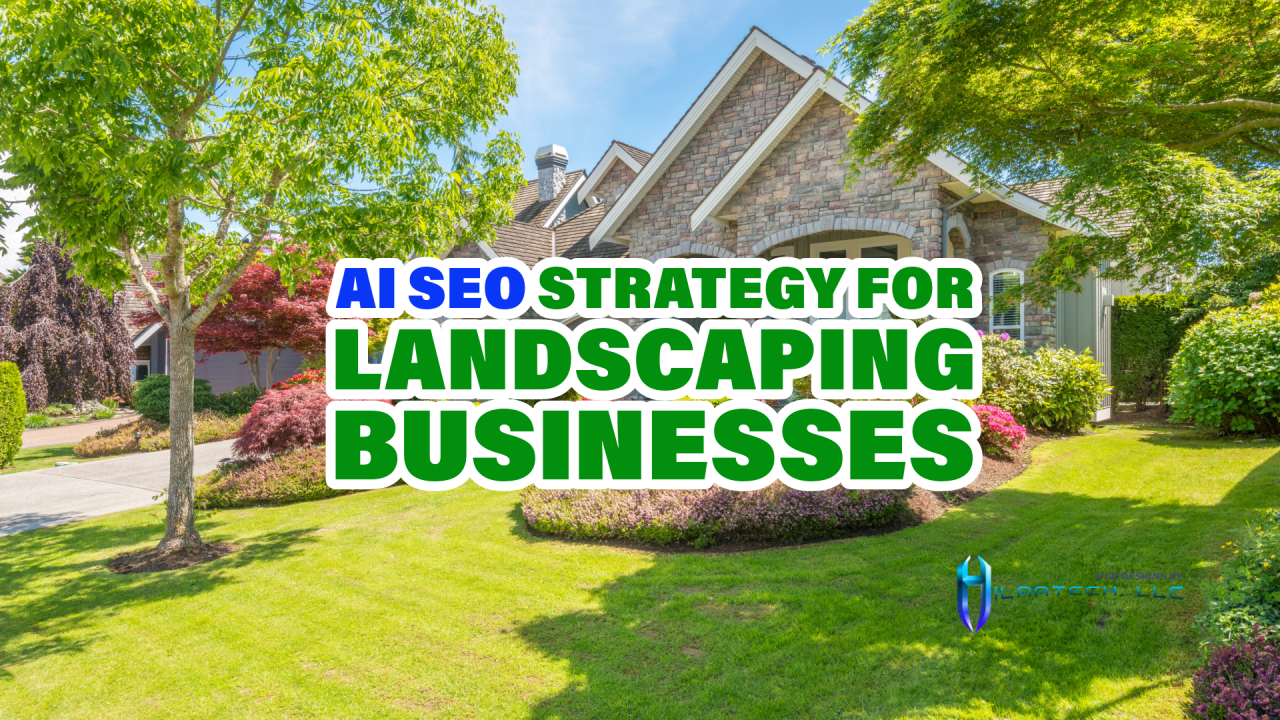AI SEO Strategy for Landscaping Businesses
In landscaping businesses, where lawn mowing, snow plowing, hardscapes, and lawn treatment are in constant demand, an AI-driven SEO strategy is a pivotal tool for digital success. Embracing AI’s capabilities can elevate your landscaping business’s online visibility, connecting you with clients actively seeking your expertise. This strategy is about integrating technology and crafting a digital presence as meticulous and refined as the landscapes you create. By harnessing the power of AI to optimize your website for local searches, tailor content to your audience’s needs, and enhance user experience, your landscaping business can thrive in the digital ecosystem, attracting more leads and converting them into loyal customers.
1. Local SEO Optimization:
Given the local nature of landscaping services, your AI SEO strategy should prioritize local SEO. Utilize AI tools to analyze local search trends and optimize your website for geo-specific keywords, such as “lawn mowing services in [City]” or “snow plowing near me.” Ensure your business is listed and accurately represented on local directories and Google My Business, enhancing your visibility in local search results and Google Maps.
2. Service-Specific Keyword Optimization:
Deploy AI to conduct deep keyword research, identifying high-traffic, relevant keywords for each service. For instance, target specific phrases like “hardscape design services” or “organic lawn treatment.” Integrate these keywords seamlessly into your website’s content, meta descriptions, titles, and URLs to improve your site’s relevance and visibility for these targeted searches.
Here are 15 Keyword Examples
- “Local lawn mowing services near me”
- “Professional snow plowing contractors”
- “Custom hardscape design services”
- “Eco-friendly lawn treatment solutions”
- “Residential landscaping experts in [City]”
- “Commercial snow removal services”
- “Affordable lawn care packages”
- “Organic lawn fertilization companies”
- “Retaining wall installation services”
- “Seasonal garden maintenance plans”
- “Landscape lighting designers near me”
- “Drought-resistant landscaping ideas”
- “Local hardscaping and paving services”
- “Emergency tree removal services”
- “Innovative landscape design for small yards”
3. Content Creation and Optimization:
Use AI-powered content analysis tools to identify content gaps and opportunities on your website. Create informative, engaging content that addresses common customer queries, showcases your expertise, and highlights the benefits of your services. Regularly update your blog with posts on topics like lawn care tips, seasonal landscaping advice, or the latest trends in hardscape design, incorporating targeted keywords to boost your SEO.
4. User Experience and Website Performance:
Leverage AI to monitor and enhance the user experience on your website. Ensure your site is mobile-friendly, fast-loading, and easy to navigate, providing a positive user experience that can reduce bounce rates and improve your search rankings. AI tools can also provide insights into user behavior on your site, helping you make data-driven improvements.
5. Reputation Management and Reviews:
Utilize AI to monitor and manage your online reputation, mainly focusing on collecting and showcasing customer reviews. Encourage satisfied customers to leave positive reviews on your Google My Business profile and other relevant platforms. Positive reviews enhance your local SEO and build trust with potential customers.
6. Link Building and Online Presence:
Use AI to identify opportunities for building high-quality backlinks to your website. Engaging in community events, local sponsorships, or collaborations with other local businesses can provide valuable backlinks and improve your site’s authority. Ensure your landscaping business is active on relevant social media platforms. Use them to share your content, engage with your audience, and drive traffic to your website.
7. Performance Tracking and Adaptation:
Finally, employ AI-driven analytics to track the performance of your SEO strategycontinuously. Monitor key metrics such as website traffic, search rankings, and conversion rates to understand what’s working and where there’s room for improvement. Use these insights to refine and adapt your strategy, ensuring it remains effective and aligned with your business goals.
By implementing these AI-enhanced SEO tactics, your landscaping business can improve its online visibility, attract more local customers, and grow its reputation as a leader in the landscaping industry.
Maximizing Local SEO Investment: The Crucial Role of Website and Mobile Optimization
Investing in Local SEO is a strategic move for any business aiming to dominate its local market. However, the return on this investment can be significantly undermined if your website is not optimized correctly or delivers a poor mobile experience. The challenges of pouring funds into Local SEO without addressing these critical website issues are multifaceted. They can impact your business’s digital growth and reputation.
Website Optimization Challenges:
A website that needs to be optimized correctly can struggle to climb search engine rankings, regardless of your Local SEO efforts. Critical elements like meta tags, headings, image alt attributes, and structured data must be meticulously crafted to align with SEO best practices. With this foundation, even the most aggressive Local SEO strategies can continue, as search engines may not be able to crawl and index your site effectively, impeding your visibility and reach.
Impact of Poor Mobile Experience:
Many online searches are conducted on mobile devices in today’s digital landscape. A website that offers a subpar mobile experience can severely hamper your Local SEO investment. Mobile users expect fast, accessible, and user-friendly interactions. If your website fails to deliver this, potential customers will likely bounce back to search results, increasing your bounce rate—a negative signal to search engines that can demote your site in search rankings.
User Engagement and Conversion:
Local SEO aims to drive traffic and convert that traffic into leads and customers. A website that’s difficult to navigate slow to load, or not intuitively designed can frustrate users, reducing engagement and conversion rates. This means that even if your Local SEO efforts get people to your site, you may only see a return in increased business if your site meets users’ expectations.
Credibility and Trust:
Your website is often the first point of contact between your business and potential customers. A poorly optimized site, especially with a bad mobile experience, can harm your business’s credibility and trustworthiness. First impressions matter; a website that looks unprofessional or needs to be more professional can deter potential customers from considering your services, regardless of your Local SEO investment.
NAP Citations, standing for Name, Address, and Phone number, is a cornerstone of Local SEO, playing a pivotal role in boosting your business’s visibility in local search results. When your landscaping business’s NAP information is consistently listed across high-authority online directories, it enhances your credibility and signals to search engines like Google that your business is legitimate and well-established in your locality.
Building Trust with Search Engines and Users:
High-authority NAP citations are your business’s endorsement, contributing significantly to your Local SEO efforts. Search engines use these citations to verify the accuracy of your business details, and consistent information across various platforms reinforces your business’s authenticity. This trust is crucial for search engines and potential customers who rely on accurate information to reach your services.
Enhancing Online Visibility:
You’re expanding your digital footprint by securing NAP citations on high-authority sites. Each citation increases your chances of being found by potential clients, especially when they’re searching for landscaping services you offer, like lawn mowing or snow plowing in your area. This enhanced visibility directly correlates with increased traffic to your website and more inquiries about your services.
Impacting Local Search Rankings:
When determining your rank in local search results, Google and other search engines factor in the quantity and quality of your NAP citations. High-authority citations lend more weight, significantly impacting your Local SEO performance. The higher you rank, the more likely potential customers will find your landscaping business when they search for relevant services in your area.
Addressing the Local Competitive Landscape:
Having your business listed on prominent directories in the competitive landscaping industry can provide a competitive edge. When your NAP information is consistently cited across reputable sites, it boosts your SEO and positions your business as a prominent player in the local market, distinguishing you from competitors.
Maintaining NAP Consistency:
Ensuring that your NAP information is present on high-authority sites and consistent across all listings is crucial. Discrepancies can confuse search engines and potential customers, undermining your Local SEO efforts and potentially directing business elsewhere. Regular audits of your NAP citations help maintain their accuracy and effectiveness in bolstering your Local SEO.
Incorporating high-authority NAP citations into your Local SEO strategy is essential for landscaping businesses aiming to enhance their online presence, attract more local customers, and establish themselves as leading providers in their community.
Long-Term SEO Impact:
SEO is not a one-time task but a continuous process. Investing in Local SEO without addressing website and mobile optimization issues can lead to a cycle of diminishing returns. Search engines continuously update their algorithms to favor user-friendly, well-optimized websites. Ignoring these aspects can not only hinder your current Local SEO efforts but also impact your ability to adapt to future algorithm changes, potentially setting your business back in the long run.
In conclusion, while investing in Local SEO is vital for local business success, it should go hand in hand with thorough website and mobile optimization. Addressing these foundational elements ensures that your investment in Local SEO yields the best possible returns, driving traffic and engagement, conversions, and long-term growth for your business.
In the fiercely competitive world of landscaping, where businesses offer dynamic and diverse services, embracing AI-driven SEO and website optimization isn’t just an advantage—it’s a necessity for growth and sustainability. To thrive in this landscape, landscaping businesses must integrate AI SEO and a meticulously optimized website as the bedrock of their digital presence.
AI SEO revolutionizes traditional optimization by providing predictive insights and personalized content strategies, understanding customer behavior, and ensuring your business remains prominently positioned in search results. It’s crucial to be the go-to name that potential clients remember when seeking lawn mowing, snow plowing, hardscapes, or lawn treatment services in their area.
An optimized website is your 24/7 digital ambassador, showcasing your expertise, services, and the unique value you bring to each project. It’s where impressions are formed, and decisions are influenced, and user experience can tip the scales in your favor, converting visitors into clients. In the digital age, your website’s functionality, speed, and mobile responsiveness are not just features but fundamental elements that define your business’s online identity.
Together, AI-driven SEO and website optimization create a powerful synergy that elevates your online presence, enhances user engagement, and drives business growth. They ensure that your landscaping business is noticed, chosen, and remembered. In a marketplace where digital prowess can make or break your success, investing in AI SEO and an optimized website is not just a strategic move—it’s an essential step toward carving out your niche, outshining the competition, and cultivating a thriving landscaping business in the digital age.


